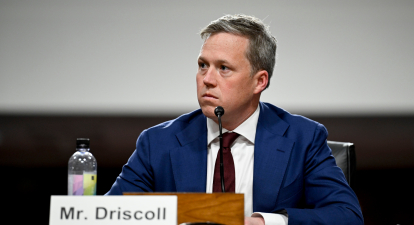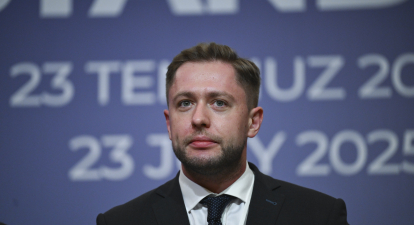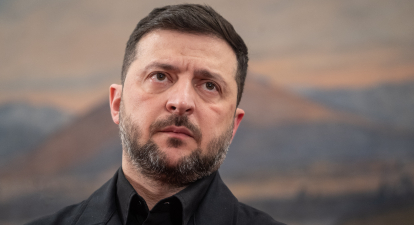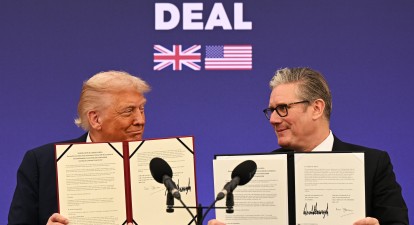
US President Donald Trump and UK Prime Minister Keir Starmer announce the agreement between the two countries during a joint press conference at Chequers. Photo Getty Images
US President Donald Trump concluded his visit to the UK with a meeting with the country's Prime Minister Keir Starmer. Forbes Ukraine has collected five conclusions from the FT, WSJ, Politico, Reuters and Bloomberg that will determine the trajectory of London-Washington interaction in the coming months.
Buy an annual subscription to six Forbes Ukraine magazines for the price of four issues. If you value the quality, depth, and power of real-world experience, this subscription is for you.
British Prime Minister Keir Starmer and US President Donald Trump held talks at Chequers on Thursday, September 18. The leaders then held a joint press conference. It was the culmination of Trump's eventful state visit to the UK, which included a royal reception at Windsor, an air show and a visit to the archives of former Prime Minister Winston Churchill.
The US president patted Starmer on the back in a friendly way, but kept quiet about potential disagreements on a number of difficult issues – Palestinian statehood, migration, energy, freedom of speech and the resignation of the British ambassador to Washington after his ties to dissident financier Jeffrey Epstein were made public, writes WSJ. Record American investments were confirmation for Keir Starmer that his proposal to invite Donald Trump again for a state visit was correct, writes Reuters. It was a risky bet: so London sought to keep the unpredictable US president on its side.

Popular Category Money Date October 01 A trend among retailers. Rozetka is the fourth retail chain to launch its own payment cards. How can the company make money from this?
Ukraine and Russian oil
The talks focused on how to bolster support for Ukraine and increase pressure on Putin to agree to a peace deal. “If the price of oil falls, Putin is out of the game. I’m willing to do other things, but not when the people I’m fighting for are buying Russian oil,” Trump said. One of the American proposals would include secondary tariffs of up to 100% on goods from China and India, as well as other trade restrictions that would reduce the flow of Russian energy resources. and prevent the transfer of dual-use goods to Russia, adds Bloomberg.
Starmer is tougher on the pace and scale of the pressure on the Russian president. “We must increase the pressure on Putin,” he says, referring to the unprecedented violations of NATO airspace, writes Politico. “It was only when the US president put pressure on Putin that he showed any willingness to move,” the prime minister added.
The EU is indeed accelerating the abandonment of Russian LNG, but the fuel market is more complicated. Europe imports petroleum products from India and Turkey, where Russian oil is processed. A ban on such purchases is planned from the beginning of next 2026, writes Bloomberg. The WSJ notes that there was no breakthrough on new US steps regarding sanctions against Russia during the visit. “This is a challenge for Europe,” Starmer said at the meeting. “There are several countries that are too dependent on Russian energy resources.”
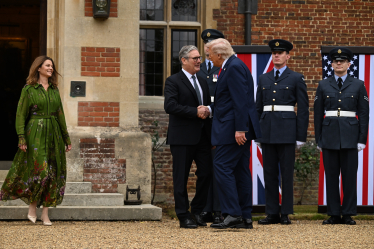
Trump insists on stopping purchases of Russian oil by allies, while Starmer supports increasing pressure on the Kremlin. Photo Getty Images
Investments and technical partnerships
London has converted the ceremony into numbers. Starmer directly linked the promised €175.5 billion in investments from American companies to Trump's visit, writes the FT. In the corporate investment package, Blackstone, in particular, is investing the most – €117 billion in AI data centers over 10 years.
The new tech partnership is set to break all records and bring about $340 billion in bilateral trade across the Atlantic, comments the WSJ on the deal. Separately, Microsoft announced $30 billion in investment in British AI. On a symbolic level, this is the synchronization of the British innovation ecosystem with American capital and hardware: data centers, supercomputers, access to models.
But behind the promises are the risks of dependency. Britain risks becoming a Silicon Valley outpost with limited autonomy, writes Reuters. Excessive rapprochement of the UK with the US could also limit British opportunities to export to the EU, which remains the UK's largest trading partner and a key driver of economic growth.
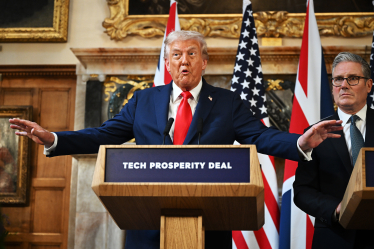
Trump calls on Britain to deploy military against illegal migration. Photo: Getty Images
Trump's tough signal on migration
“It doesn’t matter if you use the military or any other means. It destroys countries from within,” Trump said of the problem of illegal immigrants in the US and offered Starmer tougher measures in resolving the issue of migration in the UK. Trump’s rhetoric echoes the position of the leader of the British party Reform UK, Nigel Farage, on the mass deportations of migrants, the FT adds, and contrasts with the generally non-problematic tone of the visit.
Starmer responded with facts: the first flight with an illegal migrant – an Indian citizen – has already landed in Paris under the readmission agreement. But political vulnerability is not going away. The Prime Minister's ratings are falling precisely because of the topic of illegal migration, the WSJ reminds.
It is a balancing act for the government. If it accepts the White House's tough advice, it risks splitting its coalition, and if it ignores the issue, it could lose its image as an effective border manager, the FT writes.
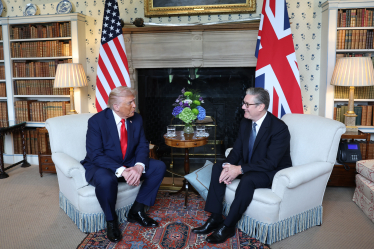
Leaders are divided on energy policy. Britain is betting on wind, while the US is promoting oil pragmatism. Photo Getty Images
Green energy
Energy has become a field of ideological differences. Starmer's government is betting on wind power and the curtailment of new oil and gas projects in the North Sea, while Trump is gently urging “to start using our own large resources,” writes the WSJ. Trump also called wind power “a very expensive joke” and advised “to use the oil from the North Sea as much as possible.”
This difference of opinion is not local, but structural. The British “green” course assumes a long game in capital-intensive generation and networks, while Trump's Washington emphasis is on a quick impact on oil prices as a tool for pressure on the Kremlin, writes Bloomberg. In practice, data centers and supercomputers from the US investment package need stable, cheap electricity, and therefore – course certainty.
If British AI is built on American infrastructure and data centers, then obviously British political influence will be naturally limited, says Alex Kirkhope, a partner at law firm Shoosmiths.
Recognition of Palestine
The issue of Palestinian statehood also remained unclear. Trump called it one of the few points of disagreement. But Starmer emphasized common interests: peace in the Middle East, the release of hostages and increased humanitarian aid to Gaza. “This is part of a comprehensive package that should lead us from a terrible situation to an outcome in the form of a safe and secure Israel, which does not exist now, and a viable Palestinian state,” he said. The US president said that he would put pressure on Israel only after the hostages are released, the WSJ adds.
London's method is a hug instead of a frontal battle. “Soft power brings tangible economic benefits,” Starmer sums up, explaining why the day of ceremonies in Windsor turned into contracts. But the Prime Minister's influence has its limits. The British steel sector still pays 25% duty for access to the US market, against 50% for other countries, and Starmer failed to achieve a reduction during this visit, writes Reuters.
“Trump is a volatile leader who behaves like a medieval king,” political scientist David Dunn told Reuters. “Britain has managed to achieve a relatively favorable attitude through quiet and cautious diplomacy.”
The actual outcome of the meeting depends on Trump's whims, not on the UK's tactics or strategy, adds economist Peter Holmes.
Materials on the topic

Category World Date September 18 The visit was not only ceremonial, but also economic and political. Donald Trump met with King Charles III for the first time as a monarch of Great Britain. How did the meeting go? Media reaction

Category War Date September 17 “Trump's Putin Strategy Has Failed.” How to End the War? Forbes Asked Representatives of Western Political Elites About This at the YES Conference

Category World Date September 15 “I don't want World War III to start.” Special Representative Keith Kellogg told Neil Ferguson what Trump achieved in Alaska, why Ukraine won't lose the war, and how effective sanctions are. The main thing

Category World Date September 13 “Trump does not want to go down in history as the one who lost Ukraine.” Interview with Boris Johnson, former Prime Minister of the United Kingdom

Category World Date September 04 In Trump we trust . How the Ukrainian religious lobby works in the US – five stories. Analysis Forbes Ukraine

Category World Date September 01 “Ordered Multipolarity.” How Trump is Unintentionally Uniting China, India, and Russia Against the Current World Order? Conclusions from the SCO Summit by WP and Bloomberg
